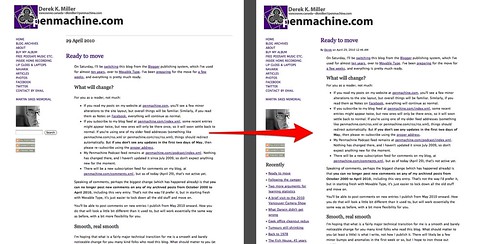I don't listen to as many podcasts as I used to, even though I am the co-host of a reasonably popular one, and also have an occasionally-updated largely musical one of my own. From 2005 through 2007 in particular, I devoured podcasts, listening in the morning while getting the kids ready for school, on the commute to and from work, sometimes at work, while driving in the car or shopping or waiting in line, while falling asleep at night, and even in hospital when I was recovering from surgery.
There are many reasons my listening habits have changed. Since I've been on medical leave for cancer treatment, I'm not commuting, and I'm also not often working on non-language right-brain stuff (such as editing images) that doesn't interfere with spoken-word podcasts. Now that I have an iPhone and an iPad, when I have time to kill either at home or out running errands, I'm more likely to fire up Twitter or a web browser or a game than to listen to a podcast.
And, because of my newfound cancer-driven appreciation for the little things in everyday life, when I go for a walk around the neighbourhood (often with the dog), I usually leave the earphones at home, and simply listen to the sounds around me.
Making a show un-missable
So while I still have quite a few podcasts in my iTunes subscription list, I miss a lot of episodes and delete many of them unheard. There are two shows I never miss, though: National Public Radio's Planet Money, and the indie show Reasonable Doubts. (Though I don't catch every episode, I also listen to almost every release—ahem—of Savage Love, after a recommendation a couple of years ago from my wife, and CBC's Spark is a regular too.)
Here's why I find both Planet Money and Reasonable Doubts un-missable: They're about the right length and frequency—around 20 minutes several times a week for Planet Money, less than an hour every week or two for Reasonable Doubts—that I can stay caught up without being overwhelmed (a problem for Leo Laporte's ever-increasing and ever-lengthening stable of shows on his TWiT network).
Both of my favourite podcasts are well-structured and excellently produced, telling compelling stories in an interesting format. Most importantly, I learn a lot about subjects that previously didn't interest me much at all: business and religion.
Clarity and economics? Really?
Before Planet Money came along, I found most business journalism about as interesting as a fishing show, or the farm report that used to come on TV before cartoons in the early mornings when I was kid: in other words, so dull it was physically painful. But when the team that would later create the standalone Planet Money podcast produced the "Giant Pool of Money" episode for This American Life in 2008, I was hooked. A single show somehow managed to explain the global economic crisis of that year, and the American housing-market meltdown that triggered it, clearly and concisely, without dumbing the subject down.
Planet Money takes a similar approach to all sorts of topics in economics, global finance, and other business subjects that I'd never normally want to delve into. Yet it fascinates me every time. This week, for instance, I learned about how Brazil changed its currency to stave off runaway inflation in 1994. Yawn, right? Not when the show has a title like "How Four Drinking Buddies Saved Brazil."
Religions explained and criticized
Reasonable Doubts doesn't emerge from a professional radio network like NPR. It's a labour-of-love amateur effort by three academics in Grand Rapids, Michigan (or "the clasp on America's Bible Bra," as they like to call it): philosophy professor Jeremy Beahan, psychologist Luke Galen, and English and mythology teacher David Fletcher. All three were raised as fundamentalist Christians, but found themselves "de-converting" in adulthood. So they bring a particularly well-informed approach to talking about, explaining, and in the end debunking the tenets of various religious traditions.
There are plenty of podcasts about rationalism, skepticism, atheism, humanism, critical thinking, and similar stuff, but many of them spend a lot of time taking apart conspiracy theories, UFOs, New Age woo, ghosts, psychics, and pseudo-medical quackery. Those are all fine, but as an atheist myself since childhood, I find that I don't know much about the religions that influence most people around the world. And the Reasonable Doubts team talks about them: Christianity (Protestant, Catholic, and Orthodox), Islam (Shiite, Sunni, and other sects), Buddhism, Hinduism, Judaism, and more.
It's not just cheap chat and atheist dismissal, either. I've learned about Christian dispensationalism, Buddhist dukkha, and the philosophical debates around determinism and free will, for instance. The hosts are careful to explain the subjects they address as carefully and completely as possible, so that their analysis and criticism make sense. And they're pretty funny in a nerdy white-guy way that appeals to me.
Keep learning
I like these shows for the same reasons I enjoy the science essays and books of Stephen Jay Gould, the TV series of James Burke, or radio programs like "Quirks and Quarks." They teach me things I didn't know before, and point me in interesting directions to learn even more.
In the modern world, we're always encouraged to keep learning for a lifetime. My favourite podcasts make that easy. I'd encourage you to give them a listen too.




